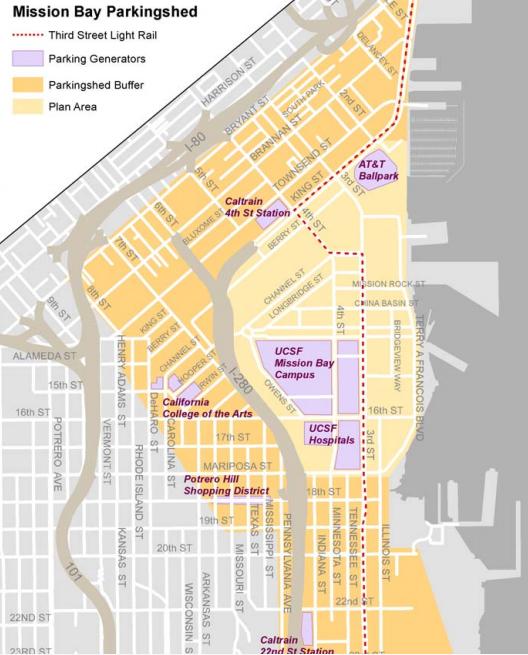An SFMTA plan to put a rational price on car parking around the developing Mission Bay area has run into fierce backlash from residents and merchants from the Potrero Hill, Dogpatch and northeastern Mission neighborhoods.
The SFPark program's Mission Bay Parking Management Strategy is "meant to address the existing severe parking availability issues and to get ready for the future," said SFPark Manager Jay Primus, who sat in on a three-hour hearing on the plan at City Hall today. "These are neighborhoods where we're going to see the majority of the city's growth in the years to come."
The plan was approved for recommendation to the SFMTA Board of Directors, save for a few blocks which the hearing officers recommended for re-evaluation.
Included in the plan's Mission Bay "Parkingshed" area are existing and planned developments that are drawing more and more commuters, including the University of California San Francisco, AT&T Park, and Caltrain stations at 22nd and Fourth Streets. It also encompasses impacted "buffer areas" like the Dogpatch and Potrero Hill neighborhoods, and SFPark expansions are also planned in the Mission around a park that's set to replace a parking lot at 17th and Folsom Streets.
But among the complaints, residents defended subsidized free parking, claiming meters would impose an undue burden on drivers in areas with poor access to transit and more residential and industrial uses than retail.
"No doubt these are complex neighborhoods," said Primus, "but they're predominantly commercial, mixed-use PDR [production, distribution and repair] areas. That doesn't mean that MTA should leave this parking utterly unmanaged. This is parking that is close to BART, Third Street light rail, and that businesses depend on for their economic vitality."
But even some supporters of SFPark, like Potrero Boosters Neighborhood Association President Tony Kelly, criticized the SFMTA for a lack of outreach to neighbors.
"We do not have space for everybody in their car to drive to work, so we need parking management," said Kelly, "but for god's sake, if you've got 2,000 people in the neighborhood saying you haven't talked to us, then maybe you need to talk to us."
Primus defended the outreach efforts, saying staff does its best "to engage with every individual."
"We've reached out to every large group we could in these areas," said Primus. "It's impossible to reach everyone. Judging by the meeting today, clearly, the word has gotten out there, and that's great. This is part of a healthy process for SFMTA."
"Sometimes you feel like you could send an engraved invitation and people would still say they've never heard about it," said Cheryl Brinkman, a member of the SFMTA Board of Directors. She pointed out that even though flyers were put on every door in the outreach for the Masonic Avenue redesign project, some still complained it wasn't enough.
"I think as city dwellers, we sometimes underestimate what people are willing to do for free parking," she added.
Among the organizations supporting the plan are Livable City and the San Francisco Bicycle Coalition, who sent letters to the SFMTA this week encouraging staff to move it forward.
"The expansion of metered spaces will provide the parking turnover that neighborhood-serving businesses need," wrote Livable City Executive Director Tom Radulovich in his letter. "SFPark metering and pricing will also reduce cruising for parking in these neighborhoods. Cruising for parking generates traffic which delays Muni, produces greenhouse gas emissions, and distracted drivers making multiple turns endanger pedestrians and cyclists in these increasingly pedestrian- and cycling-oriented neighborhoods."
But ending the subsidy of free parking rarely comes without a fight, and opponents seemed geared up to return when the plan goes before the SFMTA Board of Directors for final approval in February. Contrary to the doomsday predictions of critics, Primus warned that the plan's approval will be crucial to the success of those neighborhoods.
"Mismanaging parking in this area is going to hold back the economic growth and vitality in the city," said Primus, "and that would be a shame."
We will be off for Dr. Martin Luther King, Jr. Day. Have a great weekend, and we will see you back here on Tuesday.





